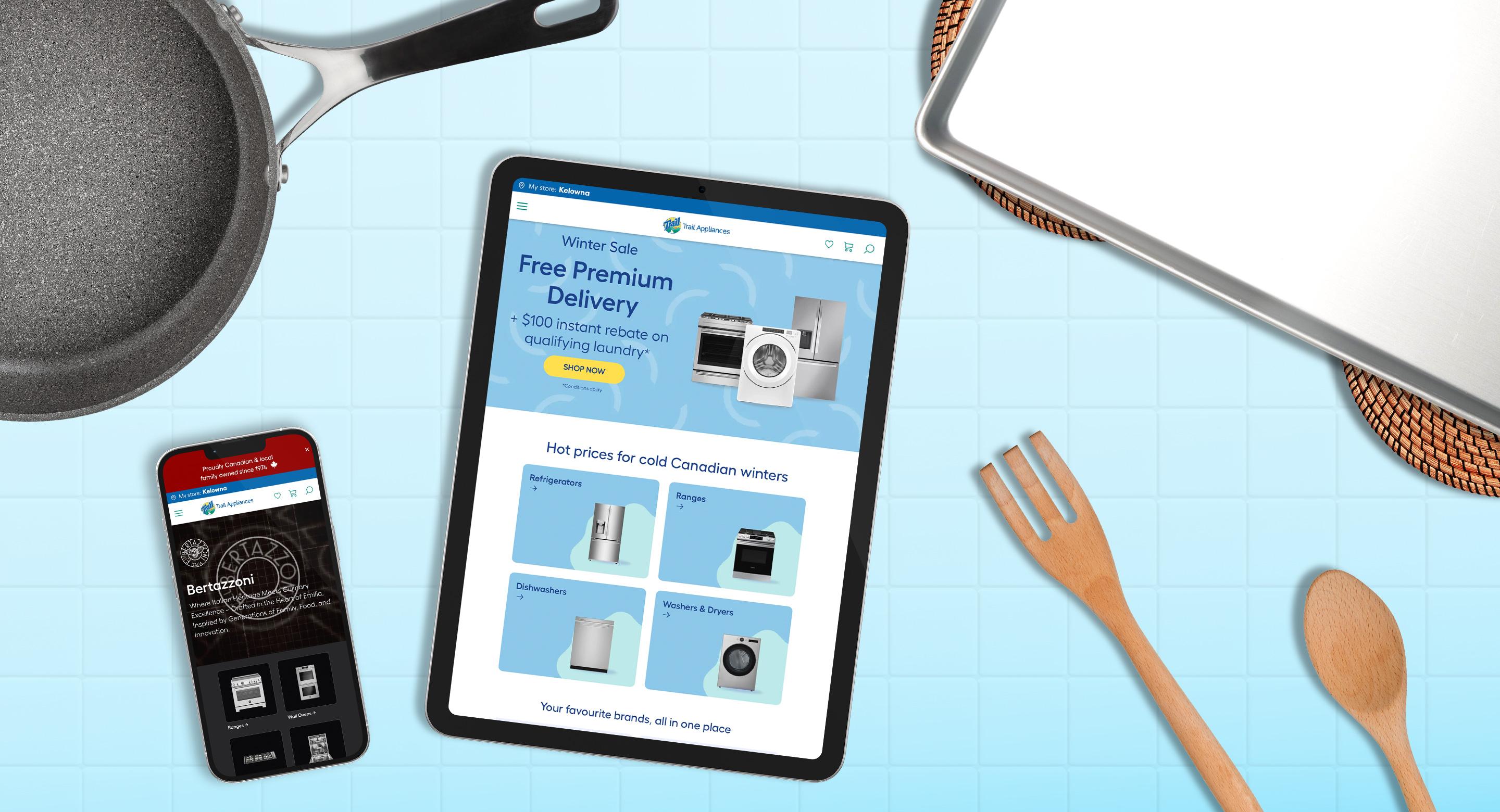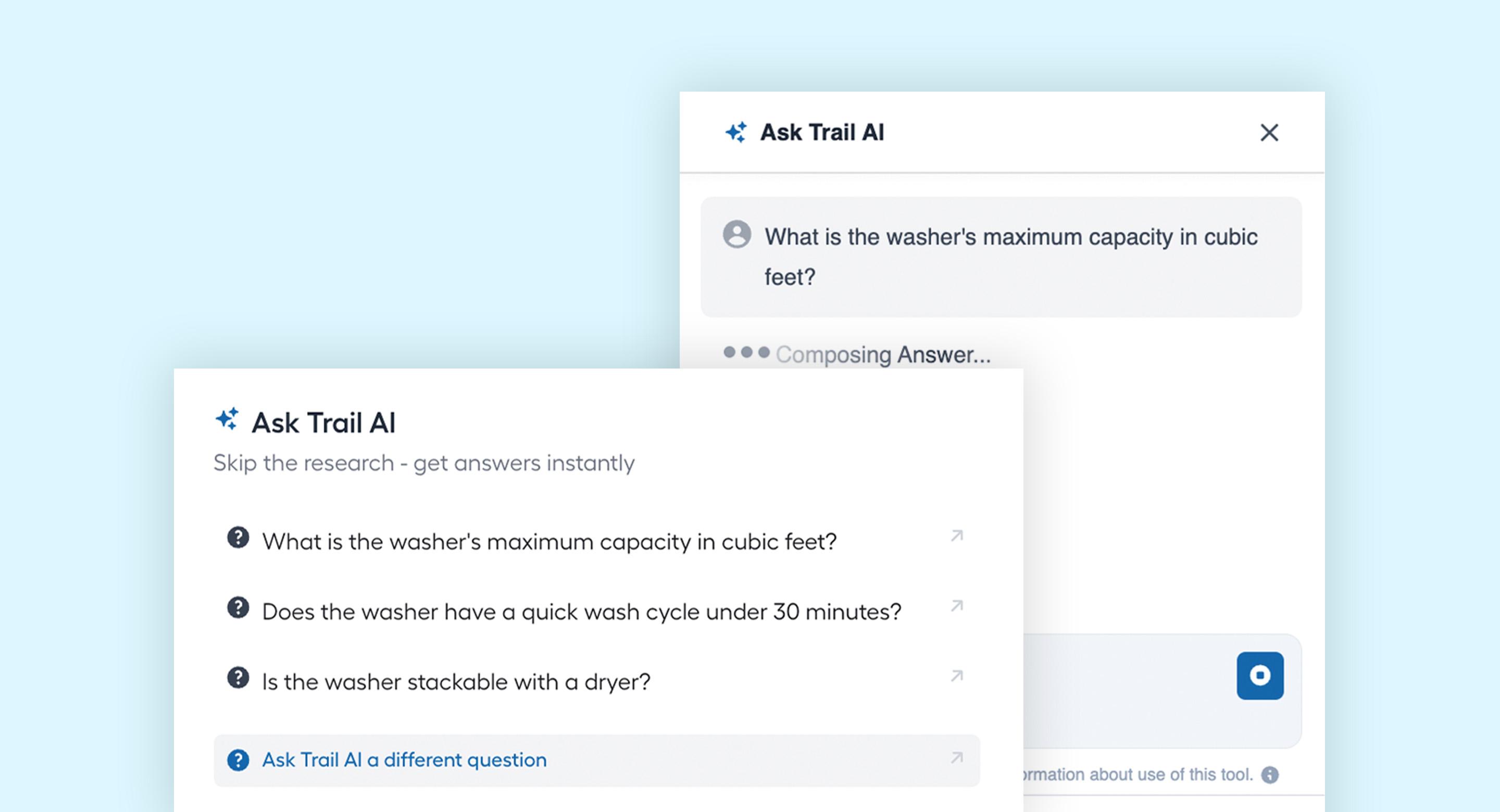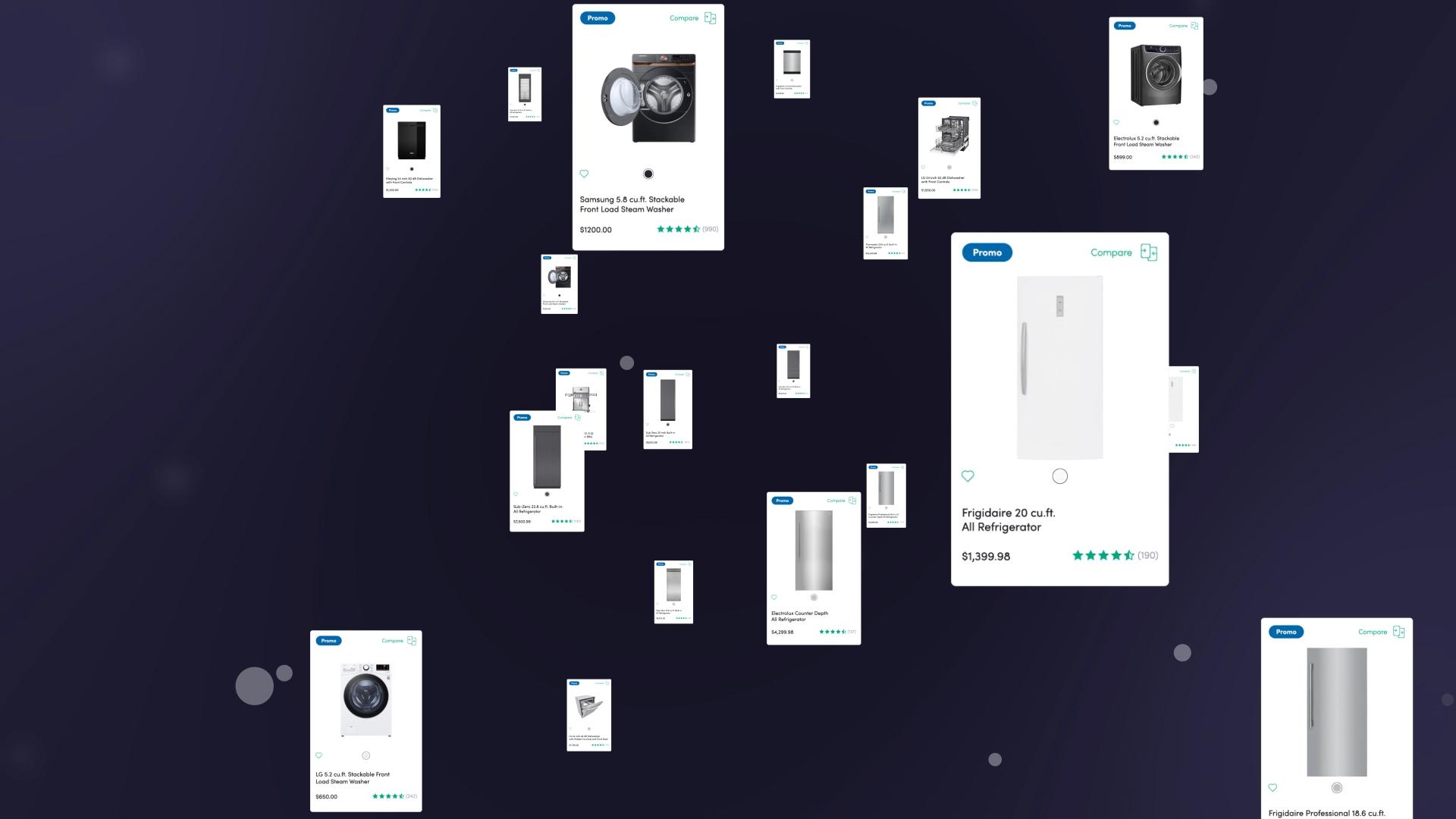Internal pilots to align on UX, integration strategy, and infrastructure setup.
Guiding Shoppers With Smarter Answers and Comparisons
Piloting AI-driven Q&A and Compare Agents to deliver clarity, confidence, and better buying decisions.

Trail Appliances is a leading Canadian home appliance retailer, known for helping customers navigate one of the most complex categories in retail. With hundreds of models and technical specifications, the team partnered with Orium to simplify the buying journey online and empower shoppers with the information they need to compare products and make confident purchase decisions suited to their specific needs.






The Challenge
Appliance shopping is stressful for consumers: these are long-lasting purchases with highly nuanced differences. Making the right selection can feel overwhelming for customers. Trail Appliances was finding that shoppers were often leaving product detail pages without the answers they needed.
Limited comparison tools made it difficult to evaluate product differences, while unanswered questions created uncertainty and drove additional support requests. This lack of clarity impacted shopper confidence, slowed conversions, and increased service load. The Trail team wanted to simplify the shopping experience, making it easier for customers to find the right products for them.

The Strategy
Trail Appliances partnered with Orium with a clear question in mind: could AI reduce shopper friction and improve decision-making in one of retail’s most complex categories? Rather than moving directly to a full-scale deployment, the teams agreed on a pilot-first strategy. The intent was to validate whether AI-driven agents could deliver measurable value—improving clarity for shoppers, lifting conversions, and reducing service requests—before committing to broader rollout.
Two pilots were selected to test complementary points in the buying journey. The Product Q&A Agent would explore whether instant, product-specific answers could reduce uncertainty and build buyer confidence. The Compare Agent would test whether AI-generated explanations could turn overwhelming spec tables into digestible, decision-ready insights. Together, the pilots offered a balanced way to evaluate AI’s potential: one focusing on depth of information per product, the other on clarity across products.
This dual-pilot approach also allowed Trail to de-risk the investment. By starting small, measuring results through A/B testing, and designing each pilot to be lightweight and composable, the teams could capture insights quickly, refine based on real-world usage, and ensure the work could carry forward into Trail’s upcoming commercetools relaunch.
These pilots showed us how we can safely test new AI capabilities today, while building a foundation that carries forward to our next-generation site.

The Solution
With the pilot concepts defined, Trail Appliances and Orium moved into a phased delivery plan designed to validate and scale impact. Both initiatives began as internal proofs of concept, giving the teams space to test technical underpinnings, align on user experience, and confirm data safeguards. From there, each pilot advanced into production trials on selected product pages, where engagement, usability, and conversion metrics were tracked through analytics and A/B testing.
Built with LangGraph from LangChain and supported by microservices that draw from product data, the solution uses modern frontend approaches to create a flexible framework. It’s designed to be easily integrated into different parts of the customer journey, making it possible to “lift and drop” the capability wherever it drives the most value
For the Product Q&A Agent, the solution combined auto-generated FAQs with the ability for shoppers to ask their own questions directly on the Product Detail Page (PDP). Answers surfaced instantly from trusted sources like product metadata, manuals, and Trail’s internal knowledge, then filtered through policy prompts to ensure accuracy and compliance. Beyond product details, the agent also handled common shipping and returns questions. And for a defined set of sensitive topics, it was designed to recommend connecting with a human agent. The aim: reduce drop-offs caused by unanswered questions and minimize reliance on service staff.
For the Compare Agent, the work centered on turning static spec tables into decision-making tools. Instead of forcing shoppers to parse through technical rows, the agent generated plain-language summaries of key differences between models. This gave shoppers faster clarity and positioned Trail as a helpful, knowledgeable guide in a category where purchase confidence is critical.
The pilots were structured across a 16-week timeline:
01
PHASE ONE - WEEKS 1-4
02
PHASE TWO - WEEKS 5-8
Production pilots released on 50% of web traffic to provide team with direct comparison, analytics to validate engagement and answer quality.
03
PHASE THREE - WEEKS 9-16
Full rollout across the catalog, extended to all relevant comparisons, with monitoring and optimization.
By embedding via JavaScript/iFrame, both features could be tested safely on the current commerce site with minimal disruption while ensuring portability to the 2026 commercetools relaunch. This “build once, use twice” approach enabled Trail to validate AI’s value now while securing its long-term usefulness.

Outcomes & Next Steps
The pilots highlighted how AI-driven agents can transform the product detail experience, delivering both immediate shopper benefits and long-term business value:
- Increased add-to-cart rate: Instant, trustworthy answers gave shoppers the confidence to move forward, leading to more engagement and a higher rate of add-to-cart actions from PDPs. Initial add-to-cart rates were 9x compared to the control group.
- Boosted purchase confidence: Clear, side-by-side product comparisons helped shoppers quickly understand key differences, empowering faster decisions at a critical stage in the buying journey.
- Operational efficiency: With AI handling routine product questions, Trail's support staff could redirect their time to more complex inquiries, lowering service load and improving overall efficiency.
- Future-ready architecture: Because the pilots were designed to be composable, Trail proved it could experiment safely on its current Magento site while ensuring portability to its 2026 commercetools relaunch.
The next stage will focus on scaling these wins across the full catalog and broader shopper base. This includes:
- Expanding coverage: Rolling out Q&A and Compare Agents across 100% of web traffic to ensure consistency for every shopper.
- Validating at scale: Measuring conversion lift, engagement, and the reduction in live support requests across a larger dataset.
- Refining FAQs: Continuously tuning the auto-generated FAQs to better reflect the real questions customers are asking, ensuring relevance and alignment with shopper intent.
- Continuous tuning: Using ongoing analytics to adjust prompts, refine generated comparisons, and optimize the shopper experience over time.
By taking a test-and-learn approach, Trail Appliances not only validated that AI can directly improve the buying journey but also set a precedent for how retailers can adopt agentic tools responsibly—starting small, proving value, and scaling with confidence. The groundwork laid here positions Trail to continue exploring more advanced AI-driven experiences, from richer personalization to adaptive digital shopping journeys.


